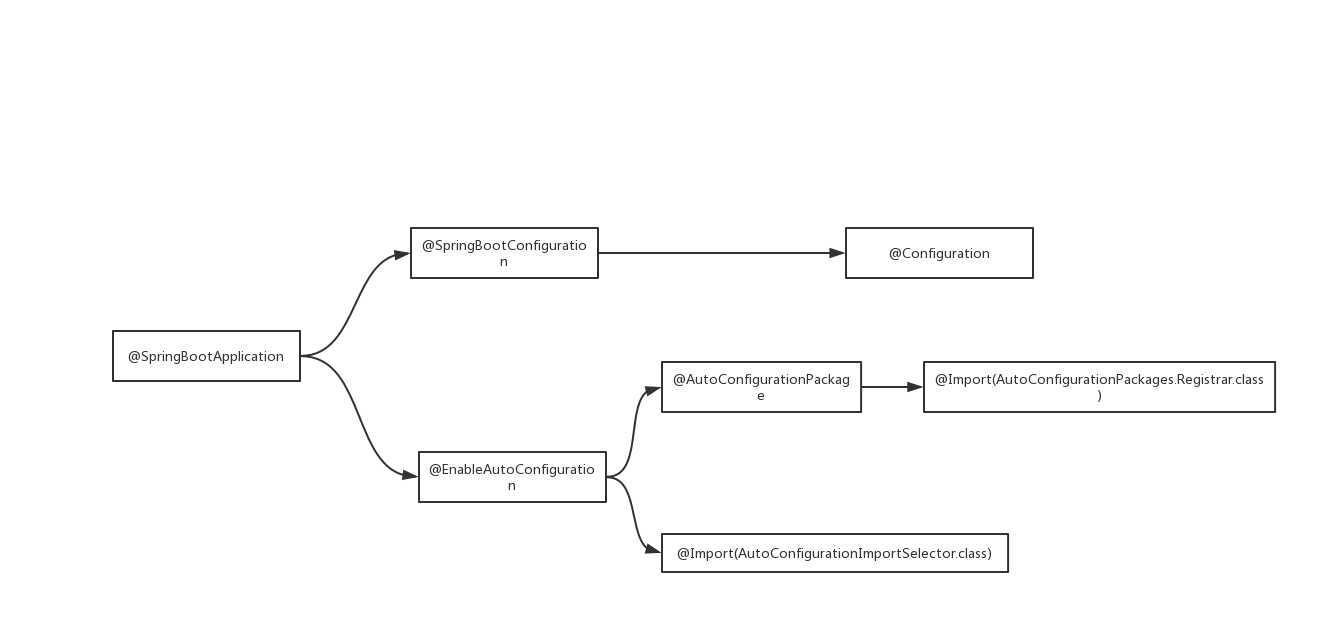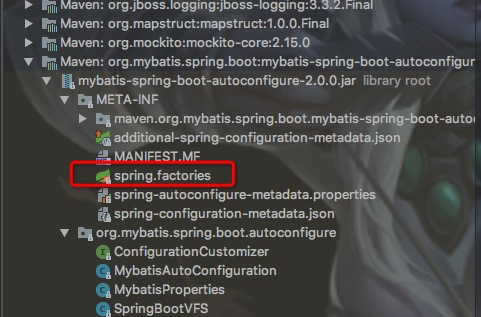本文主要是个人理思路及后续复习用,没有由浅入深详细说明,不喜勿喷哈!
先叨叨两句
spring 主要功能是IOC和AOP,它让我们只用关心Bean对象的用,而很少关系他的依赖和创建,已经很牛逼了,SpringBoot又做了什么呢,Spring其实是提供了一些通用并且优秀的配置方式,比如说Spring对Mybatis Bean的管理,其实mybatis-spring jar包中已经提供了用户各种配置的Mybatis的方式,用户可以灵活运用,但是大家用了一段时间后,发现,大家的配置方式其实都是差不多的,其他框架情况类似,于是SpringBoot出现了,他引入了一个mybatis-spring-boot-starter,其实就是大家用的比较多的并且比较优秀的配置,这样大家就更可以聚焦关注于业务,而非框架之间的配置了。
@SpringBootApplication
先上个关系图
@SpringBootApplication 通过一圈继承,最终效果相当于添加了两个重要注解 @Configuration、@Import
@Configuration是告诉spring容器,这个类是一个配置类,可以解析里边配置的@Bean等,SpringBootSPI其重要作用的是@Import(AutoConfigurationImportSelector.class)
先看下AutoConfigurationImportSelector类
public class AutoConfigurationImportSelector
implements DeferredImportSelector, BeanClassLoaderAware, ResourceLoaderAware,
BeanFactoryAware, EnvironmentAware, Ordered {
...
@Override
public String[] selectImports(AnnotationMetadata annotationMetadata) {
if (!isEnabled(annotationMetadata)) {
return NO_IMPORTS;
}
AutoConfigurationMetadata autoConfigurationMetadata = AutoConfigurationMetadataLoader
.loadMetadata(this.beanClassLoader);
AnnotationAttributes attributes = getAttributes(annotationMetadata);
List<String> configurations = getCandidateConfigurations(annotationMetadata,
attributes);
configurations = removeDuplicates(configurations);
Set<String> exclusions = getExclusions(annotationMetadata, attributes);
checkExcludedClasses(configurations, exclusions);
configurations.removeAll(exclusions);
configurations = filter(configurations, autoConfigurationMetadata);
fireAutoConfigurationImportEvents(configurations, exclusions);
return StringUtils.toStringArray(configurations);
}
...
}
public interface DeferredImportSelector extends ImportSelector {
...
}AutoConfigurationImportSelector 实现了 DeferredImportSelector ,DeferredImportSelector又继承了ImportSelector
然后实现了ImportSelector的接口selectImports,关于ImportSelector可以参考https://blog.csdn.net/u014211122/article/details/102613253
AutoConfigurationImportSelector的selectImports 方法的逻辑大概是去SpringBoot项目 /META-INF/spring.factories文件中加载org.springframework.boot.autoconfigure.EnableAutoConfiguration,然后根据这些类的@ConditionalXXX 判断返回需要注入的配置
# Auto Configure
org.springframework.boot.autoconfigure.EnableAutoConfiguration=
org.springframework.boot.autoconfigure.admin.SpringApplicationAdminJmxAutoConfiguration,
org.springframework.boot.autoconfigure.aop.AopAutoConfiguration,
org.springframework.boot.autoconfigure.amqp.RabbitAutoConfiguration,
org.springframework.boot.autoconfigure.batch.BatchAutoConfiguration,
org.springframework.boot.autoconfigure.cache.CacheAutoConfiguration,
org.springframework.boot.autoconfigure.cassandra.CassandraAutoConfiguration,
org.springframework.boot.autoconfigure.cloud.CloudAutoConfiguration,
org.springframework.boot.autoconfigure.context.ConfigurationPropertiesAutoConfiguration,
org.springframework.boot.autoconfigure.context.MessageSourceAutoConfiguration,
org.springframework.boot.autoconfigure.context.PropertyPlaceholderAutoConfiguration,
org.springframework.boot.autoconfigure.couchbase.CouchbaseAutoConfiguration,
org.springframework.boot.autoconfigure.dao.PersistenceExceptionTranslationAutoConfiguration,
org.springframework.boot.autoconfigure.data.cassandra.CassandraDataAutoConfiguration,
org.springframework.boot.autoconfigure.data.cassandra.CassandraReactiveDataAutoConfiguration,
org.springframework.boot.autoconfigure.data.cassandra.CassandraReactiveRepositoriesAutoConfiguration,
org.springframework.boot.autoconfigure.data.cassandra.CassandraRepositoriesAutoConfiguration,
org.springframework.boot.autoconfigure.data.couchbase.CouchbaseDataAutoConfiguration,
org.springframework.boot.autoconfigure.data.couchbase.CouchbaseReactiveDataAutoConfiguration,
org.springframework.boot.autoconfigure.data.couchbase.CouchbaseReactiveRepositoriesAutoConfiguration,
org.springframework.boot.autoconfigure.data.couchbase.CouchbaseRepositoriesAutoConfiguration,
org.springframework.boot.autoconfigure.data.elasticsearch.ElasticsearchAutoConfiguration,
org.springframework.boot.autoconfigure.data.elasticsearch.ElasticsearchDataAutoConfiguration,
org.springframework.boot.autoconfigure.data.elasticsearch.ElasticsearchRepositoriesAutoConfiguration,
org.springframework.boot.autoconfigure.data.jpa.JpaRepositoriesAutoConfiguration,
org.springframework.boot.autoconfigure.data.ldap.LdapDataAutoConfiguration,
org.springframework.boot.autoconfigure.data.ldap.LdapRepositoriesAutoConfiguration,
org.springframework.boot.autoconfigure.data.mongo.MongoDataAutoConfiguration,
org.springframework.boot.autoconfigure.data.mongo.MongoReactiveDataAutoConfiguration,
org.springframework.boot.autoconfigure.data.mongo.MongoReactiveRepositoriesAutoConfiguration,
org.springframework.boot.autoconfigure.data.mongo.MongoRepositoriesAutoConfiguration,
org.springframework.boot.autoconfigure.data.neo4j.Neo4jDataAutoConfiguration,
org.springframework.boot.autoconfigure.data.neo4j.Neo4jRepositoriesAutoConfiguration,
org.springframework.boot.autoconfigure.data.solr.SolrRepositoriesAutoConfiguration,
org.springframework.boot.autoconfigure.data.redis.RedisAutoConfiguration,
org.springframework.boot.autoconfigure.data.redis.RedisReactiveAutoConfiguration,
org.springframework.boot.autoconfigure.data.redis.RedisRepositoriesAutoConfiguration,
org.springframework.boot.autoconfigure.data.rest.RepositoryRestMvcAutoConfiguration,
org.springframework.boot.autoconfigure.data.web.SpringDataWebAutoConfiguration,
org.springframework.boot.autoconfigure.elasticsearch.jest.JestAutoConfiguration,
org.springframework.boot.autoconfigure.flyway.FlywayAutoConfiguration,
org.springframework.boot.autoconfigure.freemarker.FreeMarkerAutoConfiguration,
org.springframework.boot.autoconfigure.gson.GsonAutoConfiguration,
org.springframework.boot.autoconfigure.h2.H2ConsoleAutoConfiguration,
org.springframework.boot.autoconfigure.hateoas.HypermediaAutoConfiguration,
org.springframework.boot.autoconfigure.hazelcast.HazelcastAutoConfiguration,
org.springframework.boot.autoconfigure.hazelcast.HazelcastJpaDependencyAutoConfiguration,
org.springframework.boot.autoconfigure.http.HttpMessageConvertersAutoConfiguration,
org.springframework.boot.autoconfigure.http.codec.CodecsAutoConfiguration,
org.springframework.boot.autoconfigure.influx.InfluxDbAutoConfiguration,
org.springframework.boot.autoconfigure.info.ProjectInfoAutoConfiguration,
org.springframework.boot.autoconfigure.integration.IntegrationAutoConfiguration,
org.springframework.boot.autoconfigure.jackson.JacksonAutoConfiguration,
org.springframework.boot.autoconfigure.jdbc.DataSourceAutoConfiguration,
org.springframework.boot.autoconfigure.jdbc.JdbcTemplateAutoConfiguration,
org.springframework.boot.autoconfigure.jdbc.JndiDataSourceAutoConfiguration,
org.springframework.boot.autoconfigure.jdbc.XADataSourceAutoConfiguration,
org.springframework.boot.autoconfigure.jdbc.DataSourceTransactionManagerAutoConfiguration,
org.springframework.boot.autoconfigure.jms.JmsAutoConfiguration,
org.springframework.boot.autoconfigure.jmx.JmxAutoConfiguration,
org.springframework.boot.autoconfigure.jms.JndiConnectionFactoryAutoConfiguration,
org.springframework.boot.autoconfigure.jms.activemq.ActiveMQAutoConfiguration,
org.springframework.boot.autoconfigure.jms.artemis.ArtemisAutoConfiguration,
org.springframework.boot.autoconfigure.groovy.template.GroovyTemplateAutoConfiguration,
org.springframework.boot.autoconfigure.jersey.JerseyAutoConfiguration,
org.springframework.boot.autoconfigure.jooq.JooqAutoConfiguration,
org.springframework.boot.autoconfigure.jsonb.JsonbAutoConfiguration,
org.springframework.boot.autoconfigure.kafka.KafkaAutoConfiguration,
org.springframework.boot.autoconfigure.ldap.embedded.EmbeddedLdapAutoConfiguration,
org.springframework.boot.autoconfigure.ldap.LdapAutoConfiguration,
org.springframework.boot.autoconfigure.liquibase.LiquibaseAutoConfiguration,
org.springframework.boot.autoconfigure.mail.MailSenderAutoConfiguration,
org.springframework.boot.autoconfigure.mail.MailSenderValidatorAutoConfiguration,
org.springframework.boot.autoconfigure.mongo.embedded.EmbeddedMongoAutoConfiguration,
org.springframework.boot.autoconfigure.mongo.MongoAutoConfiguration,
org.springframework.boot.autoconfigure.mongo.MongoReactiveAutoConfiguration,
org.springframework.boot.autoconfigure.mustache.MustacheAutoConfiguration,
org.springframework.boot.autoconfigure.orm.jpa.HibernateJpaAutoConfiguration,
org.springframework.boot.autoconfigure.quartz.QuartzAutoConfiguration,
org.springframework.boot.autoconfigure.reactor.core.ReactorCoreAutoConfiguration,
org.springframework.boot.autoconfigure.security.servlet.SecurityAutoConfiguration,
org.springframework.boot.autoconfigure.security.servlet.UserDetailsServiceAutoConfiguration,
org.springframework.boot.autoconfigure.security.servlet.SecurityFilterAutoConfiguration,
org.springframework.boot.autoconfigure.security.reactive.ReactiveSecurityAutoConfiguration,
org.springframework.boot.autoconfigure.security.reactive.ReactiveUserDetailsServiceAutoConfiguration,
org.springframework.boot.autoconfigure.sendgrid.SendGridAutoConfiguration,
org.springframework.boot.autoconfigure.session.SessionAutoConfiguration,
org.springframework.boot.autoconfigure.security.oauth2.client.OAuth2ClientAutoConfiguration,
org.springframework.boot.autoconfigure.solr.SolrAutoConfiguration,
org.springframework.boot.autoconfigure.thymeleaf.ThymeleafAutoConfiguration,
org.springframework.boot.autoconfigure.transaction.TransactionAutoConfiguration,
org.springframework.boot.autoconfigure.transaction.jta.JtaAutoConfiguration,
org.springframework.boot.autoconfigure.validation.ValidationAutoConfiguration,
org.springframework.boot.autoconfigure.web.client.RestTemplateAutoConfiguration,
org.springframework.boot.autoconfigure.web.embedded.EmbeddedWebServerFactoryCustomizerAutoConfiguration,
org.springframework.boot.autoconfigure.web.reactive.HttpHandlerAutoConfiguration,
org.springframework.boot.autoconfigure.web.reactive.ReactiveWebServerFactoryAutoConfiguration,
org.springframework.boot.autoconfigure.web.reactive.WebFluxAutoConfiguration,
org.springframework.boot.autoconfigure.web.reactive.error.ErrorWebFluxAutoConfiguration,
org.springframework.boot.autoconfigure.web.reactive.function.client.WebClientAutoConfiguration,
org.springframework.boot.autoconfigure.web.servlet.DispatcherServletAutoConfiguration,
org.springframework.boot.autoconfigure.web.servlet.ServletWebServerFactoryAutoConfiguration,
org.springframework.boot.autoconfigure.web.servlet.error.ErrorMvcAutoConfiguration,
org.springframework.boot.autoconfigure.web.servlet.HttpEncodingAutoConfiguration,
org.springframework.boot.autoconfigure.web.servlet.MultipartAutoConfiguration,
org.springframework.boot.autoconfigure.web.servlet.WebMvcAutoConfiguration,
org.springframework.boot.autoconfigure.websocket.reactive.WebSocketReactiveAutoConfiguration,
org.springframework.boot.autoconfigure.websocket.servlet.WebSocketServletAutoConfiguration,
org.springframework.boot.autoconfigure.websocket.servlet.WebSocketMessagingAutoConfiguration,
org.springframework.boot.autoconfigure.webservices.WebServicesAutoConfiguration
OK,@SpringBootApplication 注解大概说到这儿,
SpringBoot 配置注入
- spring 启动
- 执行refresh()(十二大步)方法
- 在初始BeanFactoryPostProcessor 时,会执行ConfigurationClassPostProcessor的PostXXX方法
- 解析Import(AutoConfigurationImportSelector.class),找到一大波XXXAutoConfiguration,因为这波XXXAutoConfiguration 都是加有@Configuration,所以最后会转化为一大波Bean转化为BeanDefine并放入BeanFactory中
-
finishBeanFactoryInitialization 时 初始化将这一大波Bean实例化
- OK,SPI 大概就这样了
自定义starter
这里就以mybatis 为例 ,因为SpringBoot并没有对Mybatis做默认支持,所以mybatis-spring-boot-starter本身就是一个自定义的starter
先看下mybatis-spring-boot-starter的pom文件
<?xml version="1.0" encoding="UTF-8"?>
<!--
Copyright 2015-2019 the original author or authors.
Licensed under the Apache License, Version 2.0 (the "License");
you may not use this file except in compliance with the License.
You may obtain a copy of the License at
http://www.apache.org/licenses/LICENSE-2.0
Unless required by applicable law or agreed to in writing, software
distributed under the License is distributed on an "AS IS" BASIS,
WITHOUT WARRANTIES OR CONDITIONS OF ANY KIND, either express or implied.
See the License for the specific language governing permissions and
limitations under the License.
-->
<project xmlns="http://maven.apache.org/POM/4.0.0" xmlns:xsi="http://www.w3.org/2001/XMLSchema-instance" xsi:schemaLocation="http://maven.apache.org/POM/4.0.0 http://maven.apache.org/xsd/maven-4.0.0.xsd">
<modelVersion>4.0.0</modelVersion>
<parent>
<groupId>org.mybatis.spring.boot</groupId>
<artifactId>mybatis-spring-boot</artifactId>
<version>2.0.0</version>
</parent>
<artifactId>mybatis-spring-boot-starter</artifactId>
<name>mybatis-spring-boot-starter</name>
<properties>
<module.name>org.mybatis.spring.boot.starter</module.name>
</properties>
<dependencies>
<dependency>
<groupId>org.springframework.boot</groupId>
<artifactId>spring-boot-starter</artifactId>
</dependency>
<dependency>
<groupId>org.springframework.boot</groupId>
<artifactId>spring-boot-starter-jdbc</artifactId>
</dependency>
<dependency>
<groupId>org.mybatis.spring.boot</groupId>
<artifactId>mybatis-spring-boot-autoconfigure</artifactId>
</dependency>
<dependency>
<groupId>org.mybatis</groupId>
<artifactId>mybatis</artifactId>
</dependency>
<dependency>
<groupId>org.mybatis</groupId>
<artifactId>mybatis-spring</artifactId>
</dependency>
</dependencies>
</project>
划重点mybatis-spring-boot-autoconfigure
再看下mybatis-spring-boot-autoconfigure的项目结构图

有没有看到一个熟悉的文件spring.factories,看一看里边是什么
# Auto Configure
org.springframework.boot.autoconfigure.EnableAutoConfiguration=
org.mybatis.spring.boot.autoconfigure.MybatisAutoConfiguration
这行配置的意思是想我们的springBoot中增加一个Mybatis的AutoConfiguration配置,详情见
@org.springframework.context.annotation.Configuration
@ConditionalOnClass({ SqlSessionFactory.class, SqlSessionFactoryBean.class })
@ConditionalOnSingleCandidate(DataSource.class)
@EnableConfigurationProperties(MybatisProperties.class)
@AutoConfigureAfter(DataSourceAutoConfiguration.class)
public class MybatisAutoConfiguration implements InitializingBean {
private static final Logger logger = LoggerFactory.getLogger(MybatisAutoConfiguration.class);
private final MybatisProperties properties;
private final Interceptor[] interceptors;
private final ResourceLoader resourceLoader;
private final DatabaseIdProvider databaseIdProvider;
private final List<ConfigurationCustomizer> configurationCustomizers;
public MybatisAutoConfiguration(MybatisProperties properties,
ObjectProvider<Interceptor[]> interceptorsProvider,
ResourceLoader resourceLoader,
ObjectProvider<DatabaseIdProvider> databaseIdProvider,
ObjectProvider<List<ConfigurationCustomizer>> configurationCustomizersProvider) {
this.properties = properties;
this.interceptors = interceptorsProvider.getIfAvailable();
this.resourceLoader = resourceLoader;
this.databaseIdProvider = databaseIdProvider.getIfAvailable();
this.configurationCustomizers = configurationCustomizersProvider.getIfAvailable();
}
@Override
public void afterPropertiesSet() {
checkConfigFileExists();
}
private void checkConfigFileExists() {
if (this.properties.isCheckConfigLocation() && StringUtils.hasText(this.properties.getConfigLocation())) {
Resource resource = this.resourceLoader.getResource(this.properties.getConfigLocation());
Assert.state(resource.exists(), "Cannot find config location: " + resource
+ " (please add config file or check your Mybatis configuration)");
}
}
@Bean
@ConditionalOnMissingBean
public SqlSessionFactory sqlSessionFactory(DataSource dataSource) throws Exception {
SqlSessionFactoryBean factory = new SqlSessionFactoryBean();
factory.setDataSource(dataSource);
factory.setVfs(SpringBootVFS.class);
if (StringUtils.hasText(this.properties.getConfigLocation())) {
factory.setConfigLocation(this.resourceLoader.getResource(this.properties.getConfigLocation()));
}
applyConfiguration(factory);
if (this.properties.getConfigurationProperties() != null) {
factory.setConfigurationProperties(this.properties.getConfigurationProperties());
}
if (!ObjectUtils.isEmpty(this.interceptors)) {
factory.setPlugins(this.interceptors);
}
if (this.databaseIdProvider != null) {
factory.setDatabaseIdProvider(this.databaseIdProvider);
}
if (StringUtils.hasLength(this.properties.getTypeAliasesPackage())) {
factory.setTypeAliasesPackage(this.properties.getTypeAliasesPackage());
}
if (this.properties.getTypeAliasesSuperType() != null) {
factory.setTypeAliasesSuperType(this.properties.getTypeAliasesSuperType());
}
if (StringUtils.hasLength(this.properties.getTypeHandlersPackage())) {
factory.setTypeHandlersPackage(this.properties.getTypeHandlersPackage());
}
if (!ObjectUtils.isEmpty(this.properties.resolveMapperLocations())) {
factory.setMapperLocations(this.properties.resolveMapperLocations());
}
return factory.getObject();
}
private void applyConfiguration(SqlSessionFactoryBean factory) {
Configuration configuration = this.properties.getConfiguration();
if (configuration == null && !StringUtils.hasText(this.properties.getConfigLocation())) {
configuration = new Configuration();
}
if (configuration != null && !CollectionUtils.isEmpty(this.configurationCustomizers)) {
for (ConfigurationCustomizer customizer : this.configurationCustomizers) {
customizer.customize(configuration);
}
}
factory.setConfiguration(configuration);
}
@Bean
@ConditionalOnMissingBean
public SqlSessionTemplate sqlSessionTemplate(SqlSessionFactory sqlSessionFactory) {
ExecutorType executorType = this.properties.getExecutorType();
if (executorType != null) {
return new SqlSessionTemplate(sqlSessionFactory, executorType);
} else {
return new SqlSessionTemplate(sqlSessionFactory);
}
}
/**
* This will just scan the same base package as Spring Boot does. If you want
* more power, you can explicitly use
* {@link org.mybatis.spring.annotation.MapperScan} but this will get typed
* mappers working correctly, out-of-the-box, similar to using Spring Data JPA
* repositories.
*/
public static class AutoConfiguredMapperScannerRegistrar
implements BeanFactoryAware, ImportBeanDefinitionRegistrar, ResourceLoaderAware {
private BeanFactory beanFactory;
private ResourceLoader resourceLoader;
@Override
public void registerBeanDefinitions(AnnotationMetadata importingClassMetadata, BeanDefinitionRegistry registry) {
if (!AutoConfigurationPackages.has(this.beanFactory)) {
logger.debug("Could not determine auto-configuration package, automatic mapper scanning disabled.");
return;
}
logger.debug("Searching for mappers annotated with @Mapper");
List<String> packages = AutoConfigurationPackages.get(this.beanFactory);
if (logger.isDebugEnabled()) {
packages.forEach(pkg -> logger.debug("Using auto-configuration base package '{}'", pkg));
}
ClassPathMapperScanner scanner = new ClassPathMapperScanner(registry);
if (this.resourceLoader != null) {
scanner.setResourceLoader(this.resourceLoader);
}
scanner.setAnnotationClass(Mapper.class);
scanner.registerFilters();
scanner.doScan(StringUtils.toStringArray(packages));
}
@Override
public void setBeanFactory(BeanFactory beanFactory) {
this.beanFactory = beanFactory;
}
@Override
public void setResourceLoader(ResourceLoader resourceLoader) {
this.resourceLoader = resourceLoader;
}
}
/**
* {@link org.mybatis.spring.annotation.MapperScan} ultimately ends up
* creating instances of {@link MapperFactoryBean}. If
* {@link org.mybatis.spring.annotation.MapperScan} is used then this
* auto-configuration is not needed. If it is _not_ used, however, then this
* will bring in a bean registrar and automatically register components based
* on the same component-scanning path as Spring Boot itself.
*/
@org.springframework.context.annotation.Configuration
@Import({ AutoConfiguredMapperScannerRegistrar.class })
@ConditionalOnMissingBean(MapperFactoryBean.class)
public static class MapperScannerRegistrarNotFoundConfiguration implements InitializingBean {
@Override
public void afterPropertiesSet() {
logger.debug("No {} found.", MapperFactoryBean.class.getName());
}
}
}
到这儿,思路就很清楚了,这个配置类里边其实就是配置了一些Spring这个Mybatis的一些比较优秀通用的配置
最后
以上就是甜蜜御姐最近收集整理的关于SpringBoot SPI的全部内容,更多相关SpringBoot内容请搜索靠谱客的其他文章。








发表评论 取消回复